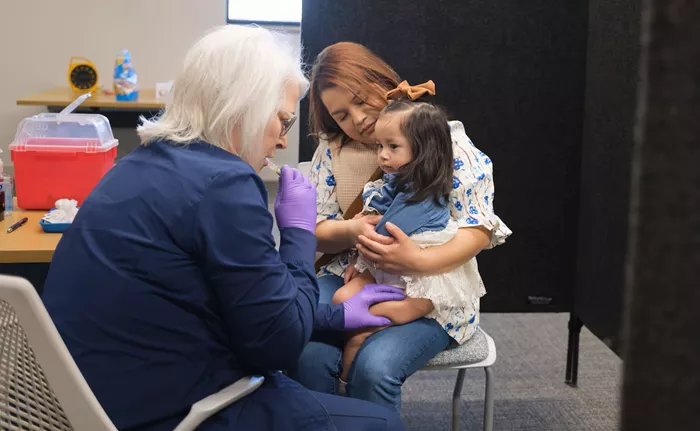As a measles outbreak swept through parts of Texas, many parents made the urgent decision to vaccinate their children sooner than scheduled, according to new health data and firsthand accounts from families and doctors.
In Lubbock, one of the state’s hardest-hit areas, 47-year-old mother Kala Hunter quickly ensured her 2-year-old son, Brady, received both doses of the measles-mumps-rubella (MMR) vaccine in March.
“Being in the hotbed of the measles outbreak, it was a no-brainer,” she said. “If it was safe to get him vaccinated early, we were going to protect him.”
Harmony Montes, 21, also from Lubbock, said she did not hesitate to get her six-month-old daughter, Melody Rocha, vaccinated during her routine checkup. “I wasn’t going to risk her health,” Montes said.
Health Officials Report Dramatic Uptick in Early MMR Doses
Their proactive approach reflects a broader trend. According to Truveta, a health data company, the number of six-month-old babies receiving the MMR vaccine in Texas in April rose more than 30 times compared to the same period last year.
“That means parents aren’t just getting the vaccine early, they’re getting it as early as they can,” said Nina Masters, a senior scientist at Truveta.
The MMR vaccine is typically given in two doses—once around a child’s first birthday and again at ages 4 to 6. The first dose provides 93% protection against measles; the second boosts that to 97%, according to the Centers for Disease Control and Prevention (CDC).
But in times of outbreaks, the first dose can be safely administered to babies as young as six months, and a second dose can follow within a month if needed.
Local Response to Public Health Crisis
Lubbock’s health authority and public health director confirmed a sharp increase in vaccination activity. Dr. Ronald Cook, chief health officer at the Texas Tech University Health Sciences Center, emphasized the importance of community-wide vaccination in stopping viral spread.
“Vaccinations are a key public health measure,” Cook said. “They help contain the virus—even in areas already affected by outbreaks.”
Lubbock County public health director Katherine Wells reported more than 2,500 additional MMR doses administered than expected in the last three months. “That’s significant,” she said. “Parents are acting fast.”
Community Tragedies Spark Urgency
The surge in early immunizations follows a heartbreaking reality: two children in West Texas died from measles. This tragedy has pushed many parents to act.
Gail Shooter, a mother in Lubbock, had her 2-year-old son, Connor, receive his second MMR dose ahead of schedule following the deaths. “Those children died at the same hospital where my babies were born,” she said. “It’s very scary.”
Vaccination Acceptance Remains Strong Nationally
Nationwide, support for childhood MMR vaccination remains high. A poll by the University of Pennsylvania’s Annenberg Public Policy Center found that 83% of Americans believe the benefits of the MMR vaccine outweigh any potential risks.
While some vaccine hesitancy remains, public health messaging and firsthand experiences appear to be making an impact. “This is a huge increase,” Masters said. “It’s a striking shift in vaccination behavior.”
Measles Cases Showing Signs of Slowing
The Texas Department of State Health Services reported 722 confirmed measles cases as of Tuesday, only a slight increase from earlier in May. This suggests the outbreak may be slowing after weeks of rapid spread.
Health experts credit the early vaccinations and increased public awareness. “As more people learn about the outbreak, they tend to stay home if symptoms appear and get vaccinated quickly,” Masters added.
Expert Advice: What Parents Should Know
Doctors recommend following CDC guidelines but also adjusting based on public health circumstances:
First MMR dose: Normally at 12-15 months, but can be given as early as 6 months during outbreaks.
Second MMR dose: Usually given between ages 4 and 6, but can be given one month after the first dose in outbreak scenarios.
Side effects: Mild fever or rash may occur, but serious complications are rare.
Dr. Cook emphasized the importance of consulting pediatricians. “Parents should talk to their doctors, especially if their child is in a high-risk area,” he said.
The Takeaway
The measles outbreak in Texas has sparked a proactive and urgent response from many parents. Health professionals stress that early MMR vaccination is safe, effective, and one of the best ways to prevent a dangerous and highly contagious disease.
For parents, the message is clear: during an outbreak, timely vaccination could be lifesaving.
Related topics:
- Bedner Growers Cucumber Recall Due to Salmonella Across 15 States
- Pain Drug Gabapentin Linked to Longer Brain Cancer Survival
- TikTok Helps Ohio Mom Catch Rare Nail Cancer Early


